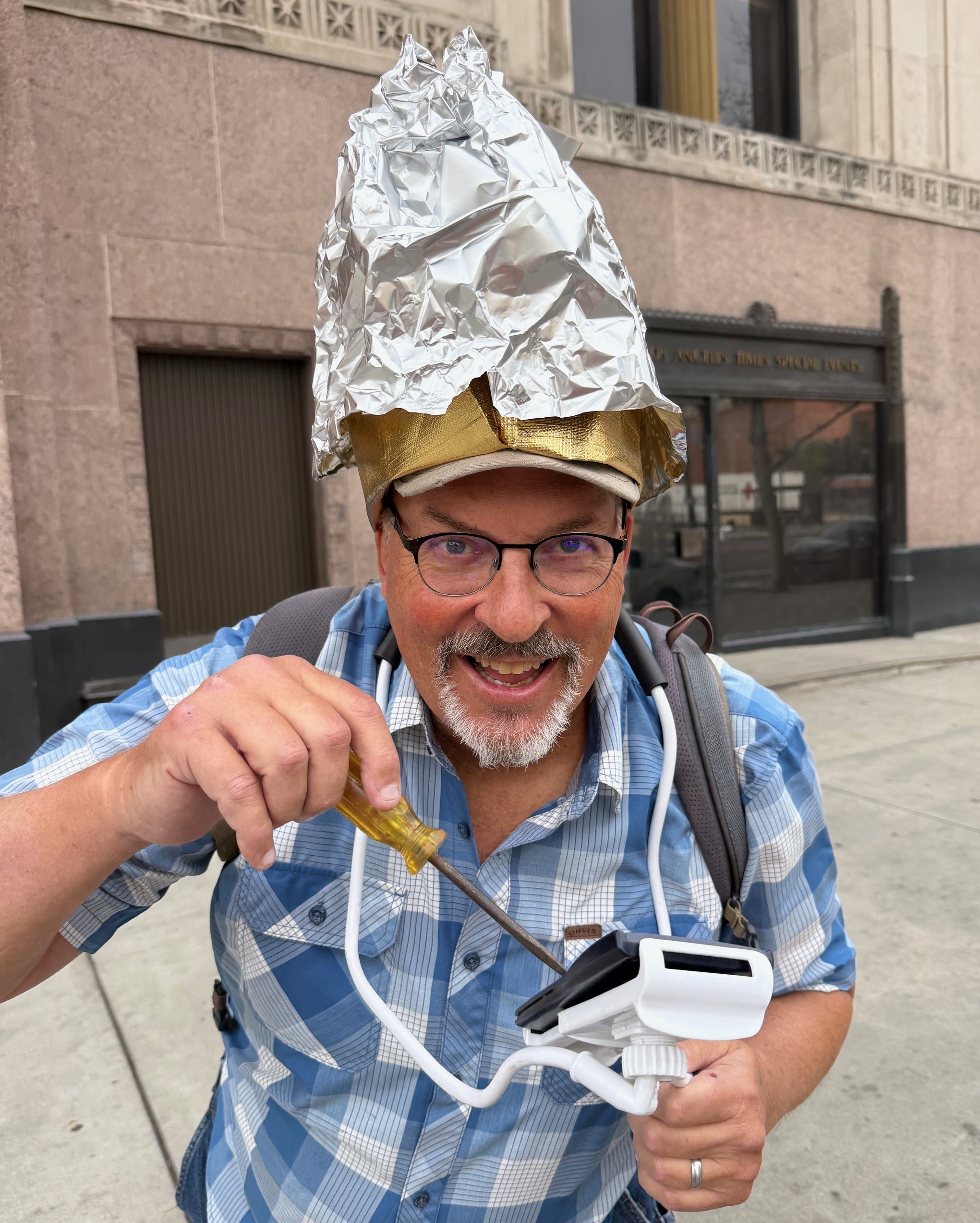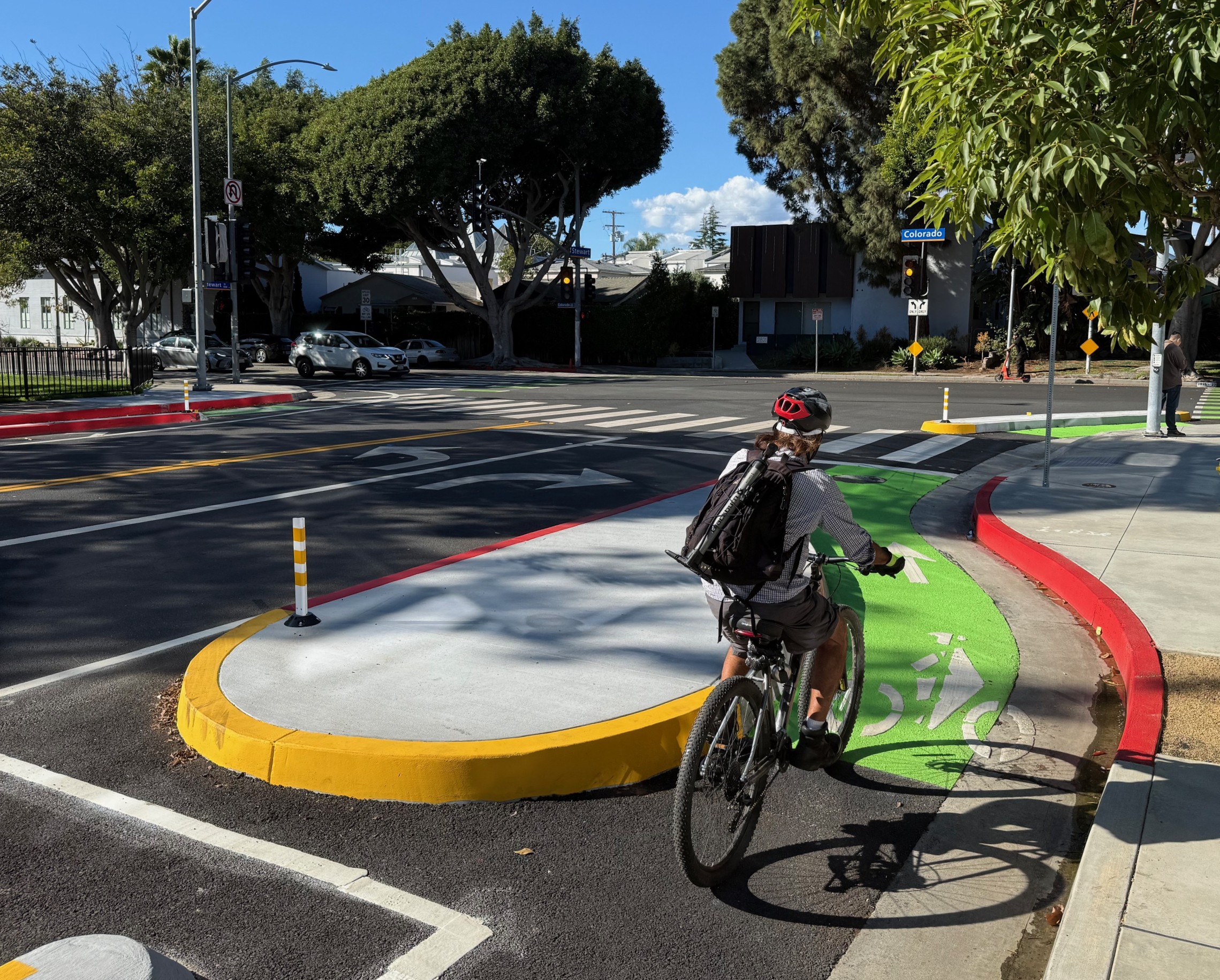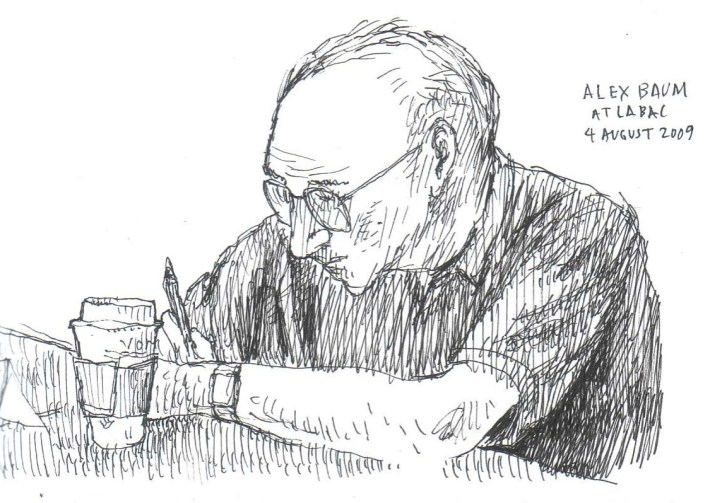
Los Angeles' bicycling community has lost one its hardest-working and longest-serving advocates, Alex Baum. Alex Baum (1922-2015) was a survivor of the Nazi holocaust, a successful businessman, and a persistent champion for bicycling in Los Angeles. For decades, Baum chaired the city's Bicycle Advisory Committee, and was a tireless presence in corridors of Los Angeles City Hall, urging lawmakers to make Los Angeles a great place for bicycling.
Alexandre Baum was born on December 30, 1922, in a small town near Lorraine in the disputed border region at times claimed by both France and Germany. His parents were Moritz Baum (1892-1925) and Lucienne "Laure" Lippman (1900-1986).
Though technically born in Germany, Baum identified with his French Jewish ancestry. He grew up in Vic-Sur-Seille, France.
During World War II, Alex Baum was very active in the French resistance to German occupation. He and his younger brother Marcel Baum (1924-2014) smuggled refugees across occupied France, crossing the country from Germany to Spain three times. On their fourth attempt, they were caught by Germans and imprisoned in Nazi concentration camps.
Alex and Marcel Baum spent two and a half years in the Buchenwald, Peenemunde, and Mittlebau-Dora camps in Germany. There they assembled, and in the process covertly sabotaged, German V-2 rockets. The Baum brothers had passports under the alias last name "Baumont," so they were imprisoned as political prisoners, with their Jewish identities never revealed to their captors.
In 1945, as the Allies approached and the end of the war drew near, Alex and Marcel Baum were loaded on a train bound for Bergen-Belsen Concentration Camp, where they would have likely been executed. The train unexpectedly stopped during the night and the prisoners were let out. Their German captors fled and left the prisoners to fend for themselves. Marcel and Alex were soon helped by a nearby farm family and by the Allied armies.
Marcel Baum tells their story in his memoirs:
[Upon seeing the Allied armies] all seven of us had tears in our eyes. These were tears of joy and freedom. We approached the French Army Corps where we received much needed food and lodging and the following day arrangements were made to return us to France. We received a paper known as a "fisch" with our name on it giving us permission to travel to our destination. We were unable to contact our family and we did not know where they were; however, we took a chance and returned to Limoges. We just had a feeling that we might find them there. My poor mother went daily to the railroad station to ask anyone that came off the trains that looked like they had come from a camp if they had seen her two sons. She showed them our photos. One person said yes, he had seen us and we would soon be home. Finally on June 12, 1945, we were reunited with our parents and sister. She had been hidden in a convent school during the war years. We had much to be grateful for and celebrate. Many families had lost all and others were reunited.
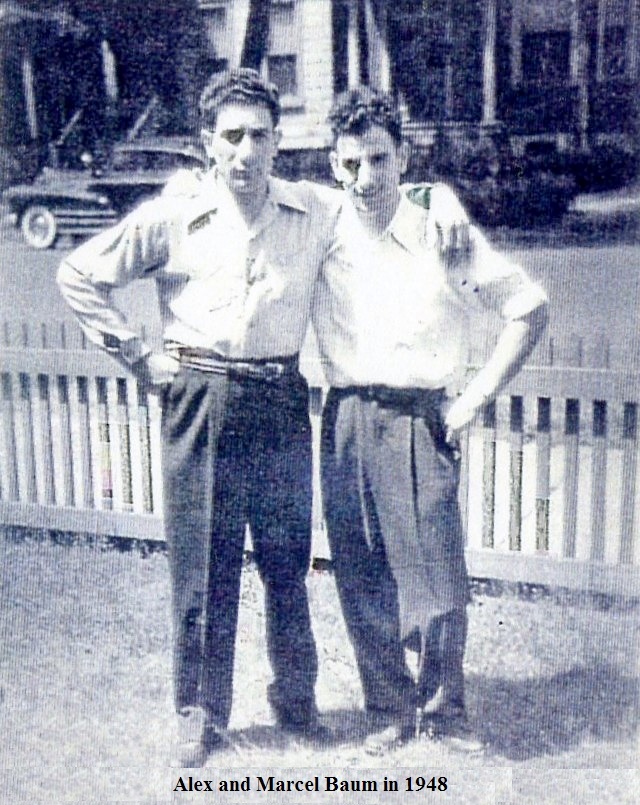
After the war, the Baum brothers returned to Vic-Sur-Seille, where Alex played soccer for France's national team.
He and his brother later immigrated to the United States, initially settling in Chicago, then nearby Sheboygan, Wisconsin. In Chicago, Alex met and married his wife, Rachel.
In 1960, Alex, Rachel, and their son and daughter moved to Los Angeles. Baum built a successful catering business.
Baum got heavily involved in promoting the sport of bicycling. He served on boards of directors for the Encino Velodrome and the United States Cycling Federation (later USA Cycling), and was the first American appointed to the Union Cycliste International. Baum was heavily involved in shaping bicycling at the 1984 Olympics in Los Angeles. Baum was a proponent of women's cycling, including expanding the events female cyclists competed in. Baum continued to play a leading role in sport bicycling, helping start the Tour of California bike race and helping build and maintain velodromes in Dominguez Hills and Encino.
Alex Baum, working with elected officials including Los Angeles Mayor Tom Bradley, was instrumental in the formation of the City of Los Angeles' Bicycle Advisory Committee (BAC.)
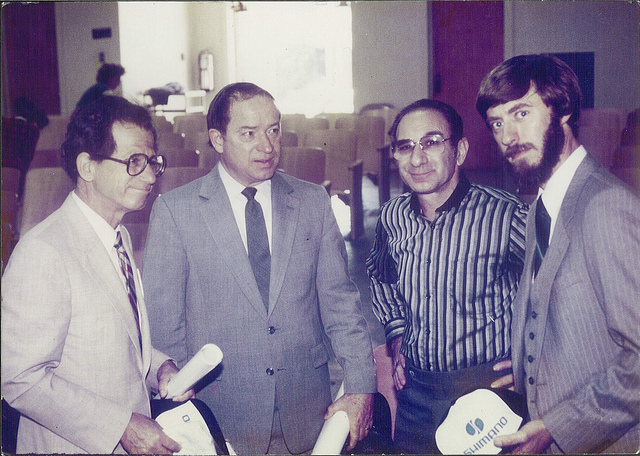
Alex Baum served on the BAC for over 30 years, serving as the committee's chair for nearly three decades. Baum was initially appointed to the BAC by Mayor Bradley, and re-appointed by successive L.A. Mayors Richard Riordan, James Hahn, Antonio Villaraigosa, and Eric Garcetti.
I first met Alex at the BAC, just like Ted Rogers of Biking in L.A..
Baum chaired the monthly BAC meetings which, during the late 1990s, took place on the top floor boardroom of the Department of Water and Power building in downtown Los Angeles. Baum ran a tight meeting, never in my recollection running over the designated 9 p.m. end time.
As BAC chair and tireless cycling advocate, Baum spent a lot of time in City Hall meeting with elected officials, departments, and agencies to press to make Los Angeles a better place for bicycling. Early on, Baum was successful in pressing the city Transportation Department (LADOT) to hire its first Bicycle Coordinator.
Baum further championed city efforts to plan and build bicycle facilities, especially the Los Angeles River bike path.
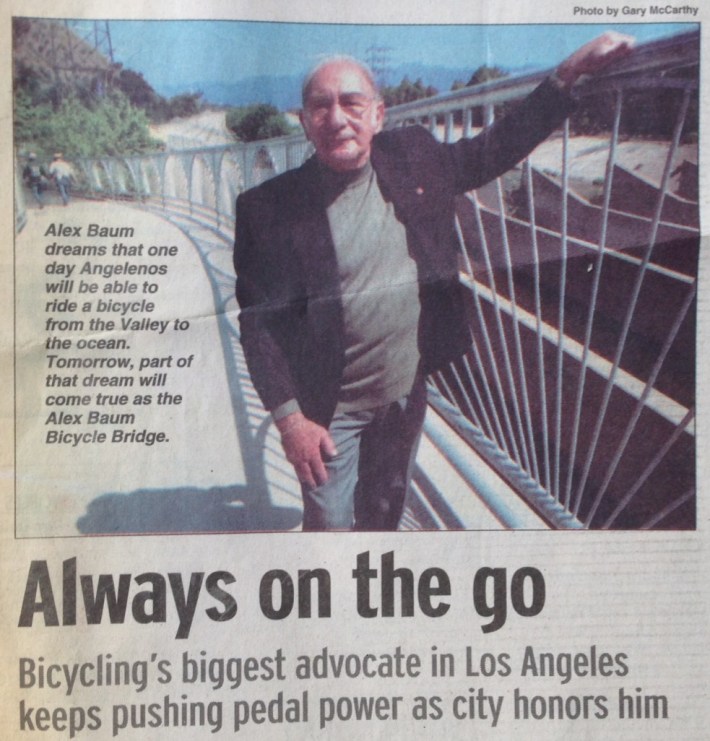
His advocacy for the river bikeway was rewarded when, in 2001, the Los Angeles City Council unanimously voted to dedicate a, then under-construction, bicycle bridge to him. The Alex Baum Bicycle Bridge runs along the Los Angeles River, allowing cyclists a safe and convenient way to get across the busy Los Feliz Boulevard. The bridge was completed in early 2002, with its opening ceremony taking place May 2 honoring Baum and his contributions to bicycling.
The Baum Bicycle Bridge was rededicated in 2012 with an additional commemorative plaque featuring Baum's portrait.
Among the many recognitions Baum received for his stalwart bicycle advocacy were the 2012 Golden Spoke Award, presented at Good Samaritan Hospital's Blessing of the Bicycles, and the 2014 advocacy award presented by the Los Angeles County Bicycle Coalition at their 2014 awards dinner. The LACBC has named their annual bike advocacy award after him; it is the Alex Baum Award for Achievement in Advocacy.
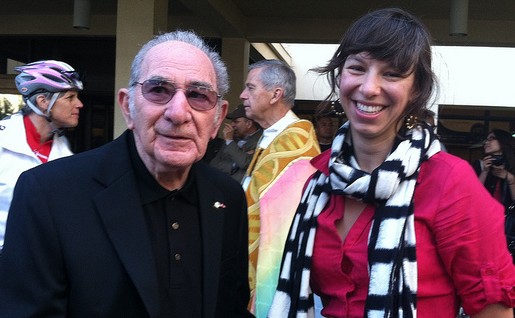
Alex was a tireless advocate who often expressed frustration that the city wasn't doing enough for bicycling, and that bicyclists were not sufficiently organized or vocal enough to show up at public meetings and demand our fair share.
Though there's still a lot of work to do, Alex Baum witnessed several major transformations that he laid the groundwork for. The city approved bike plans in 1996 and 2011. In recent years, LADOT has implemented more miles of bike lane than ever before. The L.A. River bike path is being completed, phase by phase. Under the leadership of chair Jeff Jacobberger, the BAC continues to be an increasingly strong and influential voice for improving the city's bicycling environment. The LADOT's small dedicated bikeways staff has grown, in number and in respect. The LADOT is headed by a new general manager who is prioritizing bicycling and walking.
And numerous Angelenos, of all shapes and sizes, are using the facilities Baum championed, including the bridge that bears his name. And they are following in Baum's footsteps, demanding to be heard. Demanding that Los Angeles become a truly great place to bicycle.
Alex Baum's memorial service will take place Wednesday March 4 at the Santa Monic Synagogue, details here.
Thank you to Baum's daughter Danielle Gardener, Marcel Baum's family history, the Jewish Journal, and the LADOT Bike Blog, all sources for important information on Alex Baum's life.

